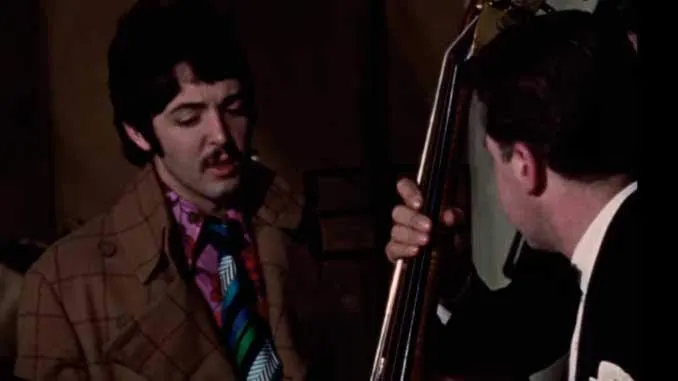
I would say, without fear of any exaggeration (the smallest, to tell the truth, it exists) that the influence of the music composed in the area of the "underground" or alternative within the world of pop and rock and roll, has too much connection and dependence with those produced in the 60's of the last century. I am referring exclusively to the Beatles. Yes, to the enormous accumulation of sounds, arrangements of all kinds, musicalization and accompaniments that the "Fab-Four" from Liverpool made in the decade they were together and as a band (1960-1970).
In this sense, truly alternative music is distinguished from fundamentalist music, basically by the flexibility in the composition instead of the more usual rigidity of the latter. So, being "open" to the mixing of sound in order to make a much richer sensory experience in objective areas, it tends to be taken as eccentric or optional. Nothing could be further from the truth, just imagine a world where Pink Floyd, Red Hot Chilli Peppers or Nine Inch Nails do not exist, it's a bit hard, isn't it?
Yo diría, sin temor a exageración alguna (la más pequeña, a decir verdad, se existir) que la influencia de la música compuesta en el área de lo "underground" o alternativo dentro del mundo del pop y el rock and roll, tiene demasiada conexión y dependencia con los producido en los años 60' del siglo pasado. Me refiero exclusivamente a los Beatles. Sí, al enorme cúmulo de sonidos, arreglos de todo tipo, musicalización y acompañamientos que hicieron los "Fab-Four" de Liverpool en la década que estuvieron juntos y como banda (1960-1970).
En este sentido, la música realmente alternativa se distingue de aquella fundamentalista, básicamente por la flexibilidad en la composición en lugar de la rigidez más habitual de esta última. De manera que, al estar "abierta" a la mezcla de sonido en orden de hacer un experiencia sensorial mucho más rica en ámbitos objetivos, tiende a ser tomada como excéntrica u opcional. Nada más alejado de la realidad, tan solo imaginemos un mundo donde Pink Floyd, Red Hot Chilli Peppers o Nine Inch Nails no existan, ¿cuesta un poco, cierto?


Now then, another series of characteristics that, evidently, the "under" owes to the Beatles, without anything to save; are the rhythmic setbacks. Totally. And you will see why and what their importance is. "A day in the life", is a song composed and written by two transcendental characters. Sir Paul McCartney and John Lennon. Both wrote it separately from each other but with the same title in mind. At the time of assembling and assembling it to be part of the famous St. Pepper's Lonely Heart Club Band, I had no idea how to put it together; since it was essentially two songs, with two different melodies, harmonies, rhythm and composition, how did it end up? There you have the result; most of the track sung with the composition written by Lennon but without leaving behind the wonderful "Woke up!, Fell out the bed..." by McCartney and one of the best and most accurate counterpoint that music could have bequeathed us.
Let's remember that this was not usual at all. At least, not in popular music. Since in the more instrumental and orchestrated music, it is of common and ordinary use. Just another day at the office, one might say, without exaggeration. So, we have already left behind the most emulated and well-replicated characteristic of the "underground". Another important deconstruction lies in the naturalness of the lyrics. Contrary to what one may think, the simplest and most essentialist things are the ones that inspire or classify majestically in alternative music. There will always be exceptions to the "rule" but that is precisely what I am trying to argue, that such a thing as a rule does not exist in the proper sense of the word.
Ahora bien, otra serie de características que, evidentemente, lo "under" le debe a los Beatles, sin nada que guardar; son los contratiempos de ritmo. Totalmente. Y verán por qué y cuál es su importancia. "A day in the life", es una canción compuesta y escrita por dos personajes trascendentales. Sir Paul McCartney y John Lennon. Ambos la escribieron separados del otro pero teniendo en mente el mismo título. Al momento de ensañarla y embamblarla para quedar dentro del famosísimo St. Pepper's Lonely Heart Club Band, no tenía ni la más remota idea de cómo armarla; puesto que en esencia eran dos canciones, con dos melodías, armonías, ritmo y composición distinta, ¿cómo acabó la cosa? Ahí tienen el resultado; la mayoría del track cantado con la composición escrita por Lennon pero sin dejar atrás el maravilloso "Woke up!, Fell out the bed..." de McCartney y uno de los mejores y más acertados contratiempos que la música nos pudo haber legado.
Recordemos, que esto no era nada usual. Al menos, no, en la música popular. Puesto que en la música más instrumental y orquestada, es de uso común y ordinario. Otro día más en la oficina, podría decirse, sin exagerar. Entonces, ya dejamos atrás la característica más emulada y bien replicada del "underground". Otra deconstrucción importante, radica en la naturalidad de las letras. Al contrario de lo que se piense, las cosas más simples y esencialistas son las que inspiran o se clasifican majestuosamente en la música alternativa. Siempre habrá excepciones a la "regla" pero es precisamente lo que intento argüir, que tal cosa como una regla no existe en el sentido más propio de la palabra.


Radiohead, British band, pioneer in rock and roll style full of mixes; trial-error and oneiric-melodic experimentation is the best example to show my point: "Everything in its right place" is a composition that flirts too closely with another genre: electronica. And for those of us who have played it ad nauseam in our headphones or stereos, it gives us a genuine feeling of positive loneliness: almost impersonal. As if it were a trailer of the existence of each individual, but all this is intangible, why? because I speak of my experience, not of the facts; and what are the facts? The refrain of the song literally describes "waking up in the morning and sucking on some lemons". Sometimes fiction imitates reality, remarkably.
And it is through the use of human magnitudes, that is, the inability we have by rigid habit, that we do incredible things. Go to the moon, think of connecting the planet through wireless, and above all, create through creativity, which cannot be repressed or ignored. And all because of (among many other artists) what some shy but effusive guys from Liverpool did more than 60 years ago and thought about what they would do when they were 64 years old, and if they would be loved and receive Valentine's Day cards (If you what I really mean "wink").
Radiohead, banda británica, pionera en estilo de rock and roll repleto de mezclas; ensayo-error y experimentación onírica-melódica es el ejemplo inmejorable para mostrar mi punto: "Everything in its right place" es una composición que coquetea demasiado cerca con otro género: la electrónica. Y para quienes la hemos reproducido hasta el hartazgo en nuestros audífonos o estéreos, nos brinda una sensación genuina de soledad positiva: casi impersonal. Como si se trata de un tráiler de la existencia de cada individuo, pero todo esto es intangible, ¿por qué? porque hablo de mí experiencia, no de los hechos; ¿y cuáles son los hechos? El estribillo del tema, literalmente, describe "despertar en la mañana y chupar unos limones". A veces, la ficción imita a la realidad, notablemente.
Y es a través del empleo de las magnitudes humanas, es decir, la incapacidad que tenemos por la costumbre rígida, que hacemos increíbles cosas. Ir a la Luna, pensar en conectar al planeta a través de lo inalámbrico, y sobre todo; crear a través de la creatividad, misma que no puede ser reprimida ni ignorada. Y todo, por (entre muchos otros artistas) lo que unos tímidos pero efusivos chicos de Liverpool hicieron hace más de 60 años y pensaban qué haría cuando tuvieran 64 años, y si serían amados y recibirían cartitas de San Valentín (If you what I really mean "guiño").